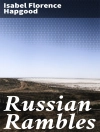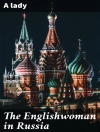In ‘Russian Rambles, ‘ Isabel Florence Hapgood embarks on a vivid journey through the vast landscapes and cultural intricacies of Russia during the late 19th century. Written with a keen eye for detail and lyrical prose, Hapgood’s work transcends mere travelogue; it serves as a rich tapestry weaving together social observations, historical context, and personal reflections. Her narratives are infused with a sense of wonder and a deep appreciation for the Russian spirit, offering readers a unique glimpse into the customs and daily life of its people, a period marked by both turbulence and transformation as the empire faced the winds of change. Isabel Florence Hapgood was a trailblazer of her time, known for her translations of Russian literature and her pioneering work in cultural diplomacy. As a woman in a male-dominated field, her experiences undoubtedly shaped the lens through which she viewed and depicted Russia. Her background in literature and her interactions with prominent Russian literary figures, such as Leo Tolstoy and Anton Chekhov, equipped her with a profound understanding of the national psyche, which she captures beautifully in her writings. ‘Russian Rambles’ is an essential read for those interested in Russian culture, history, and travel literature. Hapgood’s eloquent prose and insightful observations create a captivating narrative that invites readers to explore the depths of a country often shrouded in mystery. This book is not just a journey through Russia; it is a celebration of the human experience, making it a must-read for both scholars and casual readers alike.
关于作者
Isabel Florence Hapgood (1851–1928) was an esteemed American eclectist, translator, and writer known for her contributions to promoting Russian literature and Orthodoxy in the United States. Born in Boston, Massachusetts, Hapgood was recognized for her linguistic talents, mastering several languages that included French, Italian, and Russian. Her fascination with Russian culture and literature prompted her extensive travels to Russia, experiences from which she drew inspiration for her notable work, ‘Russian Rambles’ (1895). This book is a collection of insightful essays that provide Western readers with evocative descriptions of Russian society, traditions, and the literary scene of the late 19th century. Hapgood’s literary style is marked by a keen observational quality and an engaging narrative voice, which enabled her to bring the textures of Russian daily life and the nuances of its culture to an English-speaking audience. Furthermore, Hapgood served as a bridge between Russian and American cultures not only through her travel writings but also through her translations of significant Russian literary figures such as Tolstoy, Dostoevsky, and Chekhov. Her efforts were instrumental in shaping the Anglophone world’s understanding and appreciation of Russian literary arts. Hapgood’s intellectual vigor and cross-cultural engagement have cemented her legacy as a vital conduit and interpreter of Russian literature and civilization.












